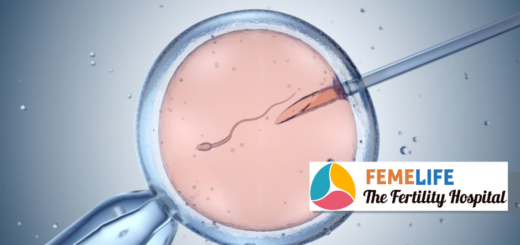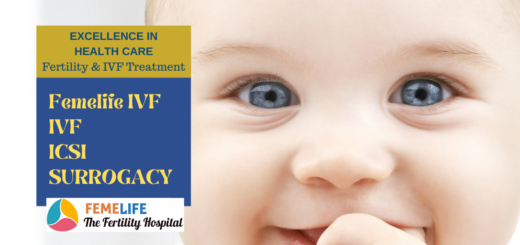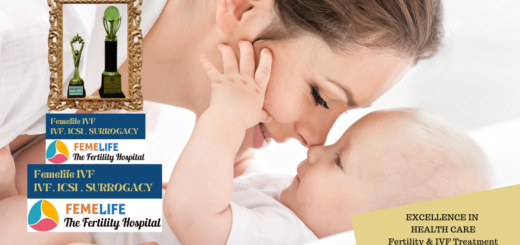Subclinical Hypothyroidism In Fertility and Pregnancy

Subclinical Hypothyroidism –
Thyroid hormone is produced by the thyroid gland present at the neck and is controlled by Thyroid Stimulating Hormone (TSH) to produce more hormones when needed. Elevated TSH levels can be a sign that the thyroid gland is under-active. When thyroid doesn’t produce enough thyroid hormones to meet, your body’s needs it is called Subclinical hypothyroidism. Subclinical hypothyroidism is an early, mild form of hypothyroidism.
Hypothyroidism can lead to infertility, increased miscarriage risk, and complications in both mother and baby. 50 to 70% of hypothyroid female patients have menstrual abnormalities. Many present with oligo menorrhea (scanty bleeding during cycle). Severe hypothyroidism is commonly associated with failure of ovulation and infertility. Ovulation and conception can occur in mild hypothyroidism. But these pregnancies are at risk of abortions, stillbirths, or prematurity.
If you are trying to conceive then proper evaluation of thyroid hormone function is essential. In fact, thyroid tests are included in basic hormone tests for infertility.
What is subclinical hypothyroidism?
SCH is classically defined as a thyrotropin (TSH) level above the upper limit of normal range (4.5−5.0 mIU/L) with normal free thyroxine
(FT4) levels. Women with unexplained infertility more commonly present with this condition than women with infertility due to a known cause.
Should non-pregnant women be treated for SCH (subclinical Hypothyroidism)?
There is no benefit from the standpoint of lipid profile or alteration of cardiovascular risk in non-pregnant women. The risk of over-treatment with thyroid hormone can result in bone loss. Hence refrain from self-treatment with thyroid hormone and consult your doctor for proper advice.
How does your thyroid affect your pregnancy?
TSH levels outside the normal pregnancy range are associated with an increased risk of pregnancy complications as placental abruption, preterm birth, foetal death, and preterm breaking of waters (premature rupture of membranes). If you are taking thyroid medications then you should continue the treatment during pregnancy. Regular tests will guide you to dosage adjustments in pregnancy.
Can you get pregnant if you have thyroid problems?
Unexplained infertility and ovulatory disorders can cause infertility in patients with low thyroid hormone levels. But you can still conceive with thyroid problem. In this scenario, you must consult you treating doctor for prevention of complications in pregnancy.
Can subclinical hypothyroidism cause a miscarriage?
Low thyroid hormone is associated with adverse reproductive outcomes. The problems include miscarriage, pregnancy complications, and delayed foetal neurodevelopment. There is fair evidence that thyroid autoimmunity (positive thyroid antibody) is associated with miscarriage and infertility. Treating TSH levels >4.0 mIU/L is associated with improved pregnancy and miscarriage rates.
What should be the thyroid level during pregnancy?
The Endocrine Society recommends the following pregnancy trimester guidelines for TSH levels: 2.5 mIU/L is the recommended upper limit of normal in the first trimester,
3.0 mIU/L in the second trimester, and 3.5 mIU/L in the third trimester.
Should there be universal screening for subclinical hypothyroidism in the first trimester of pregnancy?
The American College of Obstetricians and Gynaecologists does not recommend routine screening for hypothyroidism in pregnancy unless women have risk factors for thyroid disease. During your pregnancy, a thyroid test may not be advised if you don’t have any symptoms or risk factors. But women at high risk for thyroid disease should be screened.
Does subclinical hypothyroidism affect pregnancy?
Untreated maternal hypothyroidism can cause delayed foetal neurologic development. Children delivered to mother with untreated hypothyroid may show impaired school performance, and lower intelligence quotient (IQ).
Can thyroid cause birth defects?
Delayed foetal neurodevelopment can result from thyroid deficiency in pregnancy. Thyroid maternal under function, even when considered mild (or subclinical), may be associated with an impairment of brain development of the baby.
If you are taking thyroid hormone you will need regular checks to adjust dosage. You should not discontinue treatment without proper advice form physician. During pregnancy, you may have to alter the dosage. Regular pregnancy checks are required to prevent any complications in mother and baby.





















